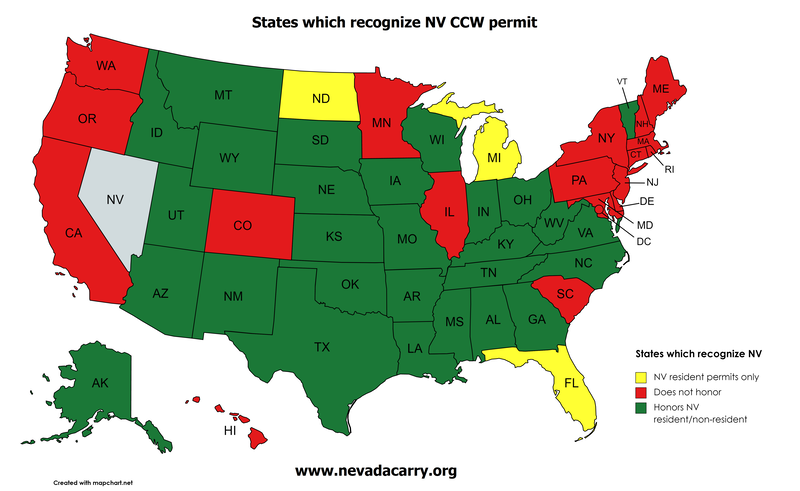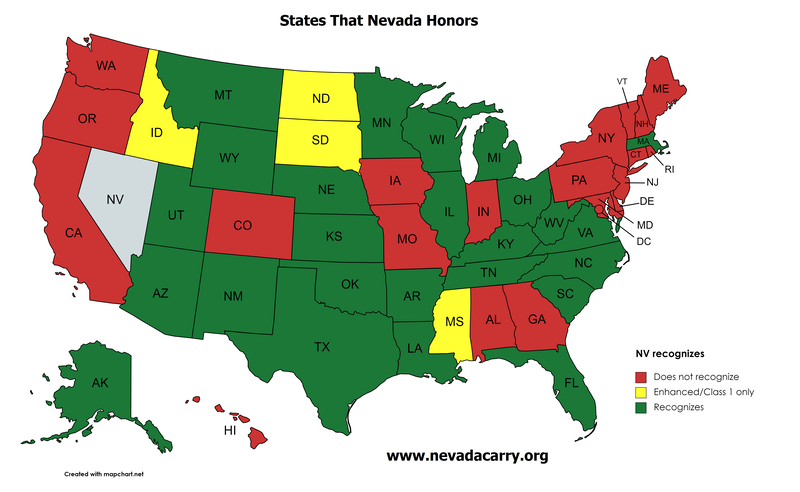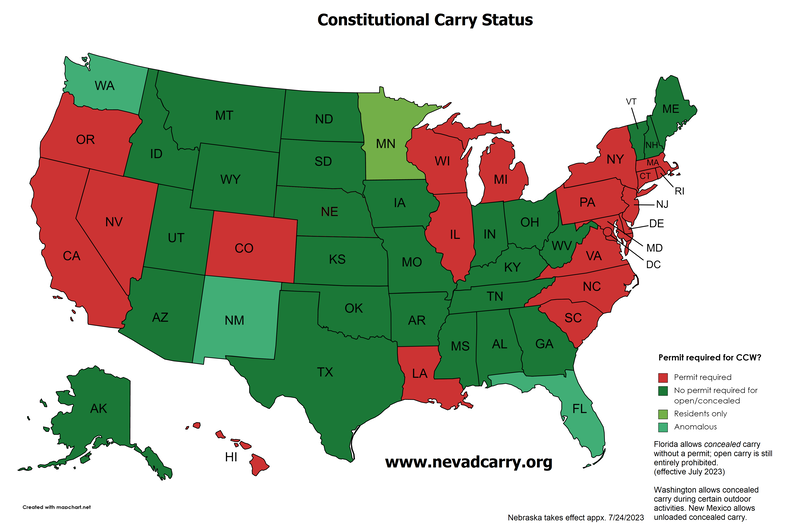“Concealed firearm” is a loaded or unloaded handgun which is carried upon a person in such a manner as not to be discernible by ordinary observation (NRS 202.3653), this includes in a carried bag/purse.
Concealing a firearm without a permit is a felony. Nevada is not a constitutional carry state.
Concealing a firearm without a permit is a felony. Nevada is not a constitutional carry state.
How to Obtain a Concealed Firearm Permit, NRS 202.3657
Part 1
Take an eight hour concealed firearm permit course approved by the sheriff. Out-of-state or military training does not qualify.
Residents: Apply to the sheriff of your county.
Non-residents: Apply to the sheriff of any county (for example, Clark County routinely takes 90-100 days to approve a concealed firearm permit). Visiting America/Nevada? You can open carry! If you are moving to Nevada and have an out-of-state permit, you must apply for a resident permit from scratch, including taking the training class.
Take an eight hour concealed firearm permit course approved by the sheriff. Out-of-state or military training does not qualify.
Residents: Apply to the sheriff of your county.
Non-residents: Apply to the sheriff of any county (for example, Clark County routinely takes 90-100 days to approve a concealed firearm permit). Visiting America/Nevada? You can open carry! If you are moving to Nevada and have an out-of-state permit, you must apply for a resident permit from scratch, including taking the training class.
Training
You must demonstrate competence with a handgun by successfully completing a course in firearm safety approved by a sheriff in this State; or successfully complete a course in firearm safety offered by a federal, state or local law enforcement agency, community college, university or national organization that certifies instructors in firearm safety. The course must include instruction in the use of handguns and in the laws of this State relating to the use of a firearm and must meet the standards of the Nevada Sheriffs’ and Chiefs’ Association.
You must demonstrate competence with a handgun by successfully completing a course in firearm safety approved by a sheriff in this State; or successfully complete a course in firearm safety offered by a federal, state or local law enforcement agency, community college, university or national organization that certifies instructors in firearm safety. The course must include instruction in the use of handguns and in the laws of this State relating to the use of a firearm and must meet the standards of the Nevada Sheriffs’ and Chiefs’ Association.
Part 2
Only one application is needed for every firearm you own and you do not have to list each firearm individually; the 'revolver/semi-automatic' distinction has been abolished as of 2011. The issued permit will cover every handgun you own or acquire.
Part 3
The sheriff shall issue a permit to any applicant who is qualified to possess a handgun under state and federal law or deny the permit for lawful reasons (NRS 202.366).
Qualifications:
1. Be 21 or older—military see below (NRS 202.3657);
2. Not a felon, a fugitive, a drug addict, have never been adjudicated mentally ill or committed, not an illegal alien, nor have been convicted of a misdemeanor crime of domestic violence (NRS 202.360).
In the Military?
Service members (active, reserve, or National Guard) and honorably discharged veterans 18-20 may also apply (AB 118, 2017). Your application will be denied if you were discharged under conditions other than honorable conditions. Nevada does not recognize Utah's equivalent permit since 7/01/2021.
Only one application is needed for every firearm you own and you do not have to list each firearm individually; the 'revolver/semi-automatic' distinction has been abolished as of 2011. The issued permit will cover every handgun you own or acquire.
Part 3
The sheriff shall issue a permit to any applicant who is qualified to possess a handgun under state and federal law or deny the permit for lawful reasons (NRS 202.366).
Qualifications:
1. Be 21 or older—military see below (NRS 202.3657);
2. Not a felon, a fugitive, a drug addict, have never been adjudicated mentally ill or committed, not an illegal alien, nor have been convicted of a misdemeanor crime of domestic violence (NRS 202.360).
In the Military?
Service members (active, reserve, or National Guard) and honorably discharged veterans 18-20 may also apply (AB 118, 2017). Your application will be denied if you were discharged under conditions other than honorable conditions. Nevada does not recognize Utah's equivalent permit since 7/01/2021.

Drugs
Smoking marijuana, especially if you have a medicinal marijuana card, makes you a prohibited person under law to own, purchase and carry firearms. Medicinal marijuana patients may be reported and their application denied. Taking or having in your possession legitimate prescription drugs (not marijuana) with a valid prescription to yourself is not illegal. Read more at the blog.
Smoking marijuana, especially if you have a medicinal marijuana card, makes you a prohibited person under law to own, purchase and carry firearms. Medicinal marijuana patients may be reported and their application denied. Taking or having in your possession legitimate prescription drugs (not marijuana) with a valid prescription to yourself is not illegal. Read more at the blog.

Application and issuance timing
Sheriffs must issue or deny a permit within 120 days of application for lawful reasons (NRS 202.366). In rare cases, temporary permits may be issued for delayed applications. Emergency temporary CCW issuance is practically unheard of. Sheriffs consider the 120 days to begin once you have been fingerprinted. Appointment waiting periods (due to scheduling demand) do not count towards the 120 days; the renewal begins when the application is accepted at the fingerprint appointment. Check with the sheriff on when you can take the class and apply or schedule the appointment early. In some counties you may need to schedule an appointment months up to a year in advance; be sure to factor in the 120 period. There is no grace period for expired permits, however sheriffs may allow renewals after expiration as a renewal vs. a new application. This would apply to fees/process only and policies may vary.
Expect a 120 day wait once you've submitted your fingerprints (sheriffs do not consider the waiting period to begin until that point). Appointment waits (some appointments are being scheduled months in advance) do not count towards the 120 days. Apply for your fingerprint appointment early in Clark or Washoe counties or apply in person. LV Metro PD (Clark County) is allowing walk-in appointments and online appointments; Washoe County requires online scheduling only and has massive delays. Rural counties are reporting about a two-month wait from application and little to no delay getting fingerprinted and turning in their applications.
Sheriffs must issue or deny a permit within 120 days of application for lawful reasons (NRS 202.366). In rare cases, temporary permits may be issued for delayed applications. Emergency temporary CCW issuance is practically unheard of. Sheriffs consider the 120 days to begin once you have been fingerprinted. Appointment waiting periods (due to scheduling demand) do not count towards the 120 days; the renewal begins when the application is accepted at the fingerprint appointment. Check with the sheriff on when you can take the class and apply or schedule the appointment early. In some counties you may need to schedule an appointment months up to a year in advance; be sure to factor in the 120 period. There is no grace period for expired permits, however sheriffs may allow renewals after expiration as a renewal vs. a new application. This would apply to fees/process only and policies may vary.
Expect a 120 day wait once you've submitted your fingerprints (sheriffs do not consider the waiting period to begin until that point). Appointment waits (some appointments are being scheduled months in advance) do not count towards the 120 days. Apply for your fingerprint appointment early in Clark or Washoe counties or apply in person. LV Metro PD (Clark County) is allowing walk-in appointments and online appointments; Washoe County requires online scheduling only and has massive delays. Rural counties are reporting about a two-month wait from application and little to no delay getting fingerprinted and turning in their applications.
Important
Do not sign your application until you are directed to so by a sheriff's employee, unless you have the form notarized.
Be sure to provide a passport style color photo of you from the front. One may be taken of you by the sheriff. You will also pay fees of not more that $60 to the sheriff (FBI fees will be extra).
The sheriff will fingerprint you. You will be 'run' through the National Instant Criminal Background Check System, the Central Repository for Nevada Records of Criminal History, and through the FBI database (NRS 202.366). Sheriffs consider the 120 days to begin once you have been fingerprinted.
Be sure to carefully review and follow all the instructions on the application form. Refer to the sheriff's instructions for how each office handles the actual application and fingerprinting process, which may vary slightly from above.
Do not sign your application until you are directed to so by a sheriff's employee, unless you have the form notarized.
Be sure to provide a passport style color photo of you from the front. One may be taken of you by the sheriff. You will also pay fees of not more that $60 to the sheriff (FBI fees will be extra).
The sheriff will fingerprint you. You will be 'run' through the National Instant Criminal Background Check System, the Central Repository for Nevada Records of Criminal History, and through the FBI database (NRS 202.366). Sheriffs consider the 120 days to begin once you have been fingerprinted.
Be sure to carefully review and follow all the instructions on the application form. Refer to the sheriff's instructions for how each office handles the actual application and fingerprinting process, which may vary slightly from above.
Denials (disqualifiers)
Your permit shall be denied if you fail to meet the above requirements or at least one of the following is true:
1. You have an outstanding arrest warrant.
2. You have been declared incompetent/insane or have been have been admitted to a mental health facility within the last 5 years.
3. You have been convicted of DUI within the last 5 years or committed to rehab for drugs or alcohol within the last 5 years.
4. You have been convicted of a violent misdemeanor within the last 3 years or are a felon.
5. You have been convicted of domestic violence or have a restraining order against you due to domestic violence.
6. You are on parole or probation or you have a suspended felony against you within the last 5 years.
7. You made a false statement on your application.
Your permit will be suspended or revoked if the sheriff finds out about you being disqualified by anything in Part 4.
See also: NRS 202.3665. If your application is denied, you may appeal in district court for the county in which you applied (NRS 202.3663).
Your permit shall be denied if you fail to meet the above requirements or at least one of the following is true:
1. You have an outstanding arrest warrant.
2. You have been declared incompetent/insane or have been have been admitted to a mental health facility within the last 5 years.
3. You have been convicted of DUI within the last 5 years or committed to rehab for drugs or alcohol within the last 5 years.
4. You have been convicted of a violent misdemeanor within the last 3 years or are a felon.
5. You have been convicted of domestic violence or have a restraining order against you due to domestic violence.
6. You are on parole or probation or you have a suspended felony against you within the last 5 years.
7. You made a false statement on your application.
Your permit will be suspended or revoked if the sheriff finds out about you being disqualified by anything in Part 4.
See also: NRS 202.3665. If your application is denied, you may appeal in district court for the county in which you applied (NRS 202.3663).

Renewal
Unless suspended or revoked, a permit is valid five (5) years from the issue date. Plan the renewal in advance, as in Clark and Washoe counties, renewal application processing can take between 90-120 days. Typically you can renew up to 120 days prior to expiration o more (depending on the sheriff and backlog situation). Complete the process as above for applying for a permit, except the fees are $25 and the class is four (4) hours (NRS 202.3677).
Expired Permits
If your permit has expired, you may not carry concealed until your renewal permit is issued. There is renewal no "grace period." The blanket 90 day extension for expiring permits due to COVID-19 has long since passed. Some sheriffs may, from an application and fee standpoint, allow a grace period where a renewal of an expired permit is considered a renewal vs. a new application; for example, Clark County (LVMPD) allows up to 364 days after expiration for a renewal to be submitted as a renewal and not as a "fresh" application.
Unless suspended or revoked, a permit is valid five (5) years from the issue date. Plan the renewal in advance, as in Clark and Washoe counties, renewal application processing can take between 90-120 days. Typically you can renew up to 120 days prior to expiration o more (depending on the sheriff and backlog situation). Complete the process as above for applying for a permit, except the fees are $25 and the class is four (4) hours (NRS 202.3677).
Expired Permits
If your permit has expired, you may not carry concealed until your renewal permit is issued. There is renewal no "grace period." The blanket 90 day extension for expiring permits due to COVID-19 has long since passed. Some sheriffs may, from an application and fee standpoint, allow a grace period where a renewal of an expired permit is considered a renewal vs. a new application; for example, Clark County (LVMPD) allows up to 364 days after expiration for a renewal to be submitted as a renewal and not as a "fresh" application.
Law Enforcement Officers
The Law Enforcement Officers Safety Act (LEOSA) or HR 218 gives retired and current law enforcement officers special privileges under federal law when carrying interstate or to obtain concealed firearm permits. See this NRA website for the text of the relevant statute and a FAQ. The Nevada Sheriffs' and Chiefs' Association has an information packet here and an application here.
When You Get Your Concealed Firearms Permit

Check the information on your card! If it is incorrect, call the sheriff's office immediately.
You must carry your permit and proper ID (such as a driver license) when carrying a concealed firearm. Both the permit and proper identification must be presented if asked by a peace officer (no duty to first inform). A violation is an infraction punishable by a $25 fine (NRS 202.3667). Note that this does not require you to carry your concealed firearm permit when carrying openly. Nevada does not require you to notify a peace officer that you are carrying a firearm, but out of courtesy, if you are being detained, you may choose to inform the officer you are lawfully carrying a concealed firearm. Gun owner's guide to rights during police encounters.
You must carry your permit and proper ID (such as a driver license) when carrying a concealed firearm. Both the permit and proper identification must be presented if asked by a peace officer (no duty to first inform). A violation is an infraction punishable by a $25 fine (NRS 202.3667). Note that this does not require you to carry your concealed firearm permit when carrying openly. Nevada does not require you to notify a peace officer that you are carrying a firearm, but out of courtesy, if you are being detained, you may choose to inform the officer you are lawfully carrying a concealed firearm. Gun owner's guide to rights during police encounters.
Address Changes
If your permanent address changes—i.e. you move--you must notify the sheriff in writing within 30 days. For Nevada residents who change counties (ex. from Washoe to Douglas), you may keep your permit from your former county until it expires, when you would renew in your new county of residence. Visit your issuing sheriff's website for forms and submission instructions.
Moving Counties
If you are a Nevada resident who moves to a new county, you do not need to re-apply in a new county, only change your address with the sheriff who issued your permit. You may keep your permit from your former county until it expires, when you would renew in your new county of residence. A renewal in a new county would still be a renewal, not a new issue in the new county. See above.
Lost Permits
If your permit is lost, stolen, or destroyed, you must within 30 days, submit a written statement to the sheriff that your permit was lost, stolen, or destroyed and pay a replacement $15 fee. Should you recover your original permit, you must return the duplicate permit and notify the sheriff in writing within 10 days (NRS 202.367).
Guns Carried
For permits issued on or after July 1, 2011, any owned handgun, semi-automatic pistol or revolver, can be carried concealed by a permittee. If the permit was issued before July 1, 2011, the permit will list the specific authorized handguns that can be legally carried. There is no legal opinion whether that requirement for pre 7/1/2011 permittees would still have legal force or is actively being enforced. All 'listed weapons' permits will expire on July 1, 2016 and licensee's renewals will cover any handgun the permittee owns.
If your permanent address changes—i.e. you move--you must notify the sheriff in writing within 30 days. For Nevada residents who change counties (ex. from Washoe to Douglas), you may keep your permit from your former county until it expires, when you would renew in your new county of residence. Visit your issuing sheriff's website for forms and submission instructions.
Moving Counties
If you are a Nevada resident who moves to a new county, you do not need to re-apply in a new county, only change your address with the sheriff who issued your permit. You may keep your permit from your former county until it expires, when you would renew in your new county of residence. A renewal in a new county would still be a renewal, not a new issue in the new county. See above.
Lost Permits
If your permit is lost, stolen, or destroyed, you must within 30 days, submit a written statement to the sheriff that your permit was lost, stolen, or destroyed and pay a replacement $15 fee. Should you recover your original permit, you must return the duplicate permit and notify the sheriff in writing within 10 days (NRS 202.367).
Guns Carried
For permits issued on or after July 1, 2011, any owned handgun, semi-automatic pistol or revolver, can be carried concealed by a permittee. If the permit was issued before July 1, 2011, the permit will list the specific authorized handguns that can be legally carried. There is no legal opinion whether that requirement for pre 7/1/2011 permittees would still have legal force or is actively being enforced. All 'listed weapons' permits will expire on July 1, 2016 and licensee's renewals will cover any handgun the permittee owns.

Only handguns (pistols and revolvers) may be carried concealed. It is a felony to carry any weapon other than a handgun (with a permit) concealed, including a rifle, shotgun, or other weapon. This would include short shotgun-type weapons and short-barreled rifles/shotguns. Permits only cover handguns. Generally, carrying an unloaded long gun in a case to/from the range, gun shop, or other legitimate firearm business is not an issue. Nevada law enforcement is expected to use discretion and common sense.
"1. Except as otherwise provided in this section and NRS 202.3653 to 202.369, inclusive, a person within this State shall not:
(d) Carry concealed upon his or her person any:
(3) Pistol, revolver or other firearm, other dangerous or deadly weapon or pneumatic gun." NRS 202.350)
"1. Except as otherwise provided in this section and NRS 202.3653 to 202.369, inclusive, a person within this State shall not:
(d) Carry concealed upon his or her person any:
(3) Pistol, revolver or other firearm, other dangerous or deadly weapon or pneumatic gun." NRS 202.350)
A handgun is defined by the NRS to be a firearm which has a short stock and is designed to be held and fired by the use of a single hand, citing 18 U.S.C. § 921(a)(29). Whether AR-style pistols are considered pistols has not been officially been decided by the state, the explicit reference to the federal definition would indicate they are indeed considered handguns.
Is insurance required in Nevada to carry (or own) a gun?
No. Insurance is not required in Nevada to own or a carry a gun. CCW or self-defense insurance is a good idea to help with a legal defense in case of a defensive gun use, but a no insurance is required.
No. Insurance is not required in Nevada to own or a carry a gun. CCW or self-defense insurance is a good idea to help with a legal defense in case of a defensive gun use, but a no insurance is required.
As a licensed concealed carrier, is my personal information public record?
No. Bare statistics, such as how many permits have been issued are permissible public records, but personally identifying information is only available to law enforcement officers/agencies in their official duties (NRS 202.3662).
Can I get a temporary concealed firearm permit?
In theory, yes. Practically, they are issued very rarely to those who have taken the course of instruction and applied for a permanent permit, usually when a clerical error delays the issuing (or denial) of the permanent permit beyond the 120-day deadline. Issuing temporary permits is solely at the discretion of the sheriff and the expiration date is set by the sheriff. Emergency temporary permits are practically unheard of.
Background Check Exemption
Most Nevada permittees qualify for an exemption from the requirement to undergo the background check (as they've already been vetted) when buying a firearm from a dealer and paying the $25 fee. The Form 4473 is still completed and a copy of the permit is needed for the dealer's records.
For permits issued on or after July 1, 2011, the permittee would be exempt from the Brady Bill background check when buying from a licensed dealer. Permits issued before this would be invalid because the ATF decertified the state after it was revealed some sheriffs were not complying with certain renewal requirements required to qualify for the exemption. This would not qualify to avoid the duty to obtain a private-sale background check if the universal background check initiative passes in 2016 or if those background checks would still be free.
No. Bare statistics, such as how many permits have been issued are permissible public records, but personally identifying information is only available to law enforcement officers/agencies in their official duties (NRS 202.3662).
Can I get a temporary concealed firearm permit?
In theory, yes. Practically, they are issued very rarely to those who have taken the course of instruction and applied for a permanent permit, usually when a clerical error delays the issuing (or denial) of the permanent permit beyond the 120-day deadline. Issuing temporary permits is solely at the discretion of the sheriff and the expiration date is set by the sheriff. Emergency temporary permits are practically unheard of.
Background Check Exemption
Most Nevada permittees qualify for an exemption from the requirement to undergo the background check (as they've already been vetted) when buying a firearm from a dealer and paying the $25 fee. The Form 4473 is still completed and a copy of the permit is needed for the dealer's records.
For permits issued on or after July 1, 2011, the permittee would be exempt from the Brady Bill background check when buying from a licensed dealer. Permits issued before this would be invalid because the ATF decertified the state after it was revealed some sheriffs were not complying with certain renewal requirements required to qualify for the exemption. This would not qualify to avoid the duty to obtain a private-sale background check if the universal background check initiative passes in 2016 or if those background checks would still be free.
Quick Guide to Reciprocity-Permit Validity Across the States
Non-residents and non-resident permits (reciprocity)
Recognized states are set by the Nevada Sheriffs’ and Chiefs’ Association pursuant to state law. If you hold a recognized permit on the reciprocity list, and you do not reside in Nevada, you may legally carry a concealed firearm in Nevada. Nevada residents must hold a Nevada-issued concealed firearm permit to carry a concealed firearm. Non-resident or out-of-state permits are not recognized for Nevada residents. There is no specific exemption for military members or their spouses. Certain permits for persons 18-20 are recognized by Nevada as long as the permit meets our basic requirements; we do not discriminate based on age.
I just moved to Nevada and I have a CCW from another state. Do I have to go through the Nevada training?
If you have recently become a resident of Nevada and hold a non-resident or out-of-state permit, there is a 60 day grace period if the sheriff of your county has not issued you a Nevada permit. For example, if you hold a concealed firearm permit from Arizona, but you live in Laughlin, it would be illegal to carry a concealed firearm in Nevada using an out-of-state permit. If you are moving to Nevada and have an out-of-state permit, you must apply for a resident permit from scratch, including taking the training class. Out-of-state permits or military training/discharge does not count as approved training. CCWs are not like going to DMV and getting a new license without taking the driving test.
Please note, that the requirements for recognition of non-resident permits have recently changed and some states may have been added or dropped.
In the Military?
PCS in Nevada? Thinking of carrying on your "home" state permit? Read this blog post to learn about residency for concealed firearm permit purposes.
Our state, our rules.
Holders of a non-resident concealed firearm permit must abide by the same restrictions in carrying a concealed firearm as they would as if they held Nevada concealed firearm permit (NRS 202.3688). On the plus side, Nevada's concealed carry laws are among the most relaxed among the states that require a permit. You can carry in bars and drink alcohol (don't get intoxicated), in cars, and signage doesn't have the force of law.
Recognized states are set by the Nevada Sheriffs’ and Chiefs’ Association pursuant to state law. If you hold a recognized permit on the reciprocity list, and you do not reside in Nevada, you may legally carry a concealed firearm in Nevada. Nevada residents must hold a Nevada-issued concealed firearm permit to carry a concealed firearm. Non-resident or out-of-state permits are not recognized for Nevada residents. There is no specific exemption for military members or their spouses. Certain permits for persons 18-20 are recognized by Nevada as long as the permit meets our basic requirements; we do not discriminate based on age.
- Utah provisional permits (ages 18-20) are no longer recognized by Nevada (as of 7/01/2021).
- Idaho enhanced permits (21 and older only) permits are the only Idaho permits recognized by Nevada.
- Arizona residents must hold an Arizona or other recognized permit to carry concealed in Nevada.
I just moved to Nevada and I have a CCW from another state. Do I have to go through the Nevada training?
If you have recently become a resident of Nevada and hold a non-resident or out-of-state permit, there is a 60 day grace period if the sheriff of your county has not issued you a Nevada permit. For example, if you hold a concealed firearm permit from Arizona, but you live in Laughlin, it would be illegal to carry a concealed firearm in Nevada using an out-of-state permit. If you are moving to Nevada and have an out-of-state permit, you must apply for a resident permit from scratch, including taking the training class. Out-of-state permits or military training/discharge does not count as approved training. CCWs are not like going to DMV and getting a new license without taking the driving test.
Please note, that the requirements for recognition of non-resident permits have recently changed and some states may have been added or dropped.
In the Military?
PCS in Nevada? Thinking of carrying on your "home" state permit? Read this blog post to learn about residency for concealed firearm permit purposes.
Our state, our rules.
Holders of a non-resident concealed firearm permit must abide by the same restrictions in carrying a concealed firearm as they would as if they held Nevada concealed firearm permit (NRS 202.3688). On the plus side, Nevada's concealed carry laws are among the most relaxed among the states that require a permit. You can carry in bars and drink alcohol (don't get intoxicated), in cars, and signage doesn't have the force of law.
I have a non-resident permit from another state, but I live in Nevada. Can I carry concealed?
No. You must have a Nevada permit to carry a concealed firearm if you reside in the state, but new residents have a 60 day grace period until they must have a Nevada permit to carry concealed legally in Nevada. CA, DC, HI, IL, MA, MD, NJ, NY (no/may-issue states) residents: You do not have to have a permit issued by your home state; this includes all non-resident permits recognized by Nevada (see maps for recognized states). NRS 202.3688
I'm from Arizona or another constitutional carry state and don't have a permit. Can I carry concealed in Nevada? No, you must have a concealed firearm permit in your home state or a non-resident state that Nevada recognizes, or a non-resident Nevada permit. Open carry does not require a permit.
No. You must have a Nevada permit to carry a concealed firearm if you reside in the state, but new residents have a 60 day grace period until they must have a Nevada permit to carry concealed legally in Nevada. CA, DC, HI, IL, MA, MD, NJ, NY (no/may-issue states) residents: You do not have to have a permit issued by your home state; this includes all non-resident permits recognized by Nevada (see maps for recognized states). NRS 202.3688
I'm from Arizona or another constitutional carry state and don't have a permit. Can I carry concealed in Nevada? No, you must have a concealed firearm permit in your home state or a non-resident state that Nevada recognizes, or a non-resident Nevada permit. Open carry does not require a permit.
Populous County Sheriff's Pages
The most populous counties' sheriff pages are listed here. While each sheriff may have slightly different policies where state law is silent, typically they are uniform. For example, LVMPD (Metro) will allow renewals up to 365 days after expiration and renew at any time. Other sheriffs may allow only 120 prior to expiration for renewals, so check policies for variances. Any variance from state law will be to the citizen's benefit. For specific instructor/local requirements, such as scheduling, please contact your sheriff's office.
Carson City Sheriff CCW page
Douglas County (Gardnerville) CCW page
LVMPD (Metro/Clark County) CCW FAQ page (Las Vegas)
Nye County (Pahrump) CCW FAQ page
Washoe (Reno) County CCW page
Douglas County (Gardnerville) CCW page
LVMPD (Metro/Clark County) CCW FAQ page (Las Vegas)
Nye County (Pahrump) CCW FAQ page
Washoe (Reno) County CCW page


